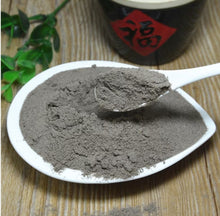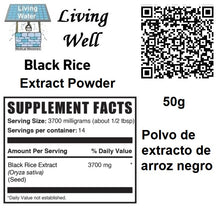Livingwell Black Rice Extract Powder
Revitalize your health routine with the Black Rice Extract powder from Livingwell – the ultimate nutritional powerhouse. Naturally jam-packed with fiber, antioxidants, and anthocyanins, our extract isn't your standard supplement; it’s a connoisseur's choice for holistic well-being. Elevate your daily nutrition with our elite Black Rice Extract powder for a vibrant and resilient you
Also called forbidden or purple rice, black rice is a type of rice that belongs to the Oryza sativa L. species. Black rice gets its signature black-purple color from a pigment called anthocyanin, which has potent antioxidant properties.
In ancient China, it’s said that black rice was considered so unique and nutritious that it was forbidden for all but royalty. Today, thanks to its mild, nutty flavor, chewy texture, and many nutritional benefits, black rice can be found in numerous cuisines around the world.
Potential Health Benefits: Some studies suggest that black rice extract may help lower blood sugar levels, improve cholesterol levels, and reduce the risk of heart disease. It is also thought to have anti-inflammatory properties, which may help with conditions such as arthritis.
Despite being less popular than other rice varieties, research shows that black rice has the highest overall antioxidant capacity and activity.
In fact, in addition to anthocyanin, black rice has been found to contain over 23 plant compounds with antioxidant properties, including several types of flavonoids and carotenoids.
Research on black rice’s effects on heart health is limited. However, many of its antioxidants have been shown to help protect against heart disease.
Flavonoids like those found in black rice have been associated with a decreased risk of developing and dying from heart disease
Anthocyanins from black rice may also have potent anticancer properties.
A review of population based studies found that higher intake of anthocyanin-rich foods was associated with a lower risk of colorectal cancer.
Furthermore, a test-tube study found that anthocyanins from black rice reduced the number of human breast cancer cells, as well as slowed their growth and ability to spread
Research shows that black rice contains high amounts of lutein and zeaxanthin — two types of carotenoids that are associated with eye health.
These compounds work as antioxidants to help protect your eyes from potentially damaging free radicals.
In particular, lutein and zeaxanthin have been shown to help protect the retina by filtering out harmful blue light waves.
Research suggests that these antioxidants may play an important role in protecting against age-related macular degeneration (AMD), which is the leading cause of blindness worldwide. They may also decrease your risk of cataracts and diabetic retinopathy
Gluten is a type of protein found in cereal grains, such as wheat, barley, and rye.
People with celiac disease need to avoid gluten, as it triggers an immune response in the body that damages the small intestine.
Gluten can also cause negative gastrointestinal side effects, such as bloating and abdominal pain, in individuals with gluten sensitivity.
While many whole grains contain gluten, black rice is a nutritious, naturally gluten free option that can be enjoyed by those on a gluten-free diet.
Black rice is a good source of protein and fiber, both of which can help promote weight loss by reducing appetite and increasing feelings of fullness.
Furthermore, early animal research suggests that anthocyanins like those found in black rice may help reduce body weight and body fat percentage
In a 6-week study in 40 women with excess weight, those who ate a mix of brown and black rice up to 3 times per day on a calorie-restricted diet lost significantly more body weight and body fat than those eating white rice
Black rice may also offer other potential benefits, including: Lower blood sugar levels. Animal studies suggest that eating black rice and other anthocyanin-containing foods may help reduce blood sugar levels in those with type 2 diabetes. Human studies are needed to confirm these effects. May decrease your risk of non-alcoholic fatty liver disease (NAFLD). A study in mice found that adding black rice to a high fat diet significantly reduced fat accumulation in the liver
El arroz negro (Oryza sativa L.) contiene altos niveles de polifenoles de antocianina, los que tienen efectos beneficiosos sobre la salud, incluidas sus propiedades antioxidantes y antiinflamatorias






